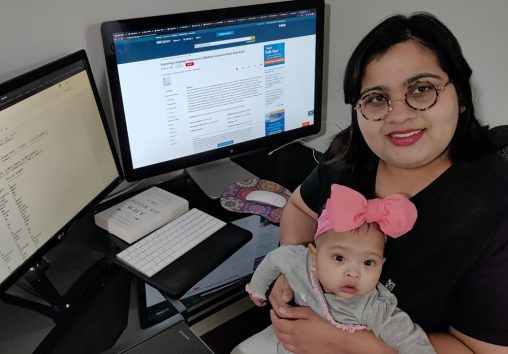
Swati Padhee, who is pursuing a Ph.D. in computer science at Wright State, researched the applications of artificial intelligence in medical assessment during an internship with the National Board of Medical Examiners.
Swati Padhee is no stranger to artificial intelligence. Currently a computer science Ph.D. student at Wright State University, Padhee was named the College of Engineering and Computer Science Intern of the Year because of her research into the applications of artificial intelligence in medical assessment.
Padhee interned with the National Board of Medical Examiners, a nonprofit organization that develops and manages assessments of health care professionals. She said was extremely excited by the board’s mission of protecting the health of the public through her use of artificial intelligence.
Her internship came during the height of the COVID-19 pandemic, and she was able to use AI as a tool for assessment in medical education.
“While AI is playing a critical role in multiple domains, exploring it for assessment science in medical education, which is the backbone of health care, attracted me,” Padhee said.
Kimberly Swygert, Padhee’s supervisor throughout her internship, said she chose Padhee for her combined experience in AI and health care. Swygert said she hoped the internship would enable Padhee to focus on her intern-specific research and help the organization explore how to apply similar methodologies within their own work.
“We were looking for someone who had a combination of excellent technical and communication skills, as well as a sense of initiative, creativity, openness to other viewpoints, and the organizational skills necessary to start with a very open research question and a lot of data,” Swygert said. “She did a phenomenal job at all of this. She was an absolute delight to have as an intern.”
Padhee said she chose Wright State to pursue her Ph.D. because the university encourages applied research to solve impactful societal issues.
“Apart from an up-to-date course structure and syllabus, the university has a diverse group of theoretical and applied research professors who have their doors open always to brainstorm on open research problems,” she said. “And the openness of various departments to collaborate on interdisciplinary research puts Wright State at the forefront of applying artificial intelligence to address multiple societal causes.”
Tanvi Banerjee, Ph.D., associate professor of computer science and engineering and director of the Data Science for Healthcare research lab, said Padhee’s non-computer science background makes her unique.
“Despite a sharp learning curve, Swati embraces every challenge I throw at her and thrives on making it a success,” Banerjee said. “She is a go-getter in every sense of the term.”
Padhee said she would tell other students seeking internships to expand their horizons outside of their current field.
“There is as much need for technical people in applied domains as well as applied people in the technical world,” Padhee said. “This internship has made me more passionate than ever to pursue a career in interdisciplinary, impactful research.”
During her internship, Padhee was pregnant and gave birth to her daughter, Sara, who is very healthy. She said the staff of the National Board of Medical Examiners was incredibly supportive and helpful to her throughout her pregnancy.
“I am blown away by the support,” she said.

 Wright State’s Homecoming Week features block party-inspired events Feb. 4–7 on the Dayton Campus
Wright State’s Homecoming Week features block party-inspired events Feb. 4–7 on the Dayton Campus  Wright State music professor honored with Ohio’s top music education service award
Wright State music professor honored with Ohio’s top music education service award  Wright State’s Industrial and Human Factors Engineering program named one of top online graduate programs by U.S. News
Wright State’s Industrial and Human Factors Engineering program named one of top online graduate programs by U.S. News  Student-run ReyRey Café celebrates decade of entrepreneurship at Wright State
Student-run ReyRey Café celebrates decade of entrepreneurship at Wright State  Wright State faculty member Damaris Serrano wins Panamanian literary award
Wright State faculty member Damaris Serrano wins Panamanian literary award 